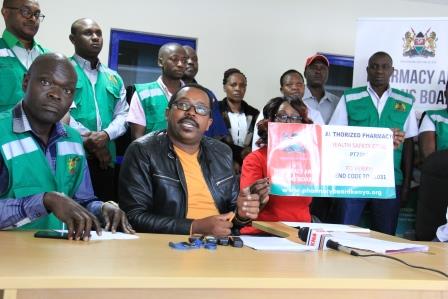The Pharmacy and Poisons Board (PPB) has closed down 137 illegal chemists in Nakuru County following a crackdown on non-compliant outlets.
During the operation which kicked off a week ago, 45 people were arrested and their stocks seized.
PPB head of Good Distribution Practices and Ports of Entry Dr Dominic Kariuki however called for an upward review of court fines and jail terms for offenders saying that most suspects were being let off the hook on very ‘affordable’ conditions.
“We have documented two cases where owners of non-compliant outlets were fined Sh 5,000. What was more baffling was that the courts ordered that confiscated pharmaceuticals be returned to the suspects despite evidence being tendered to the effect that they were not professionals,” said Dr Kariuki.
He said some non-compliant outlets were notorious for reopening closed premises after paying lenient court fines.
Dr Kariuki called on the Judiciary to assist in securing the lives of Kenyans by handing out deterrent bonds and fines on offenders.
Details of the non-compliant chemists, he said have been shared with the Regional Police Commander for enforcement of closure.
Speaking to the media in Nakuru on Friday, Dr. Kariuki said the board was concerned with the rising number of unmarked chemists in the area, urging members of the public to shun them and report the same for action to be taken.
Licensed wholesalers of drugs who supply to the illegal chemists, he said have been put on notice.
Some of the licensed chemists, he said have been left to be run by unqualified personnel, adding that the owners have been summoned for disciplinary action.
In Molo Sub-County, Dr. Kariuki said one outlet was found selling government drugs and a suspect had been arrested and arraigned before court.
He said countrywide 500 cases of professionals who had allowed their licenses to be used by quacks were being handled by the disciplinary committee.
The PPB, he disclosed has launched guidelines for good distribution practices, guidelines for transportation of pharmaceuticals and safe disposal of pharmaceutical waste.
All pharmacies and hospitals with expired drugs, he said have been directed to quarantine them and contact the board for safe disposal.
The board, he added has distributed minilabs to its regional offices for random sampling and testing of medicines in the market to ensure drugs in the market are of good quality.
Dr. Kariuki said that those not conforming to the board’s standards were charged with possession of part one poisons contrary to the Pharmacy and Poisons Act.
Other offences the suspects faced included, carrying on the business of a pharmacist without registration contrary to the Pharmacy and Poisons Act and operating in unregistered premises.
Dr. Kariuki urged members of the public to use health safety codes displayed on registered pharmacy outlets to verify legality of the premises and use SMS code 21031 which is free of charge for any clarification.
By Anne Mwale and Desire Waithaka





